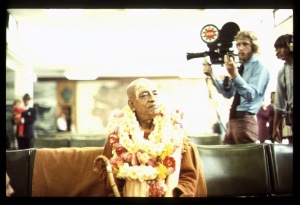SB 5.14.13: Difference between revisions
No edit summary |
(Vanibot #0054 edit - transform synonyms into clickable links, which search similar occurrences) |
||
| Line 23: | Line 23: | ||
<div class="synonyms"> | <div class="synonyms"> | ||
''ekadā'' | ''[//vanipedia.org/wiki/Special:VaniSearch?s=ekadā&tab=syno_o&ds=1 ekadā]'' — sometimes; ''[//vanipedia.org/wiki/Special:VaniSearch?s=asat&tab=syno_o&ds=1 asat]-[//vanipedia.org/wiki/Special:VaniSearch?s=prasaṅgāt&tab=syno_o&ds=1 prasaṅgāt]'' — by association of nondevotees who are against the Vedic principles and who manufacture different paths of religion; ''[//vanipedia.org/wiki/Special:VaniSearch?s=nikṛta&tab=syno_o&ds=1 nikṛta]-[//vanipedia.org/wiki/Special:VaniSearch?s=matiḥ&tab=syno_o&ds=1 matiḥ]'' — whose intelligence has been brought to the abominable status of defying the authority of the Supreme Personality of Godhead; ''[//vanipedia.org/wiki/Special:VaniSearch?s=vyudaka&tab=syno_o&ds=1 vyudaka]-[//vanipedia.org/wiki/Special:VaniSearch?s=srotaḥ&tab=syno_o&ds=1 srotaḥ]'' — into rivers without sufficient water; ''[//vanipedia.org/wiki/Special:VaniSearch?s=skhalana&tab=syno_o&ds=1 skhalana]-[//vanipedia.org/wiki/Special:VaniSearch?s=vat&tab=syno_o&ds=1 vat]'' — like jumping; ''[//vanipedia.org/wiki/Special:VaniSearch?s=ubhayataḥ&tab=syno_o&ds=1 ubhayataḥ]'' — from both sides; ''[//vanipedia.org/wiki/Special:VaniSearch?s=api&tab=syno_o&ds=1 api]'' — although; ''[//vanipedia.org/wiki/Special:VaniSearch?s=duḥkha&tab=syno_o&ds=1 duḥkha]-[//vanipedia.org/wiki/Special:VaniSearch?s=dam&tab=syno_o&ds=1 dam]'' — giving distress; ''[//vanipedia.org/wiki/Special:VaniSearch?s=pākhaṇḍam&tab=syno_o&ds=1 pākhaṇḍam]'' — the atheistic path; ''[//vanipedia.org/wiki/Special:VaniSearch?s=abhiyāti&tab=syno_o&ds=1 abhiyāti]'' — he approaches. | ||
</div> | </div> | ||
Latest revision as of 22:05, 18 February 2024

A.C. Bhaktivedanta Swami Prabhupada
TEXT 13
- ekadāsat-prasaṅgān nikṛta-matir
- vyudaka-srotaḥ-skhalanavad
- ubhayato 'pi duḥkhadaṁ
- pākhaṇḍam abhiyāti
SYNONYMS
ekadā — sometimes; asat-prasaṅgāt — by association of nondevotees who are against the Vedic principles and who manufacture different paths of religion; nikṛta-matiḥ — whose intelligence has been brought to the abominable status of defying the authority of the Supreme Personality of Godhead; vyudaka-srotaḥ — into rivers without sufficient water; skhalana-vat — like jumping; ubhayataḥ — from both sides; api — although; duḥkha-dam — giving distress; pākhaṇḍam — the atheistic path; abhiyāti — he approaches.
TRANSLATION
Sometimes, to mitigate distresses in this forest of the material world, the conditioned soul receives cheap blessings from atheists. He then loses all intelligence in their association. This is exactly like jumping in a shallow river. As a result one simply breaks his head. He is not able to mitigate his sufferings from the heat, and in both ways he suffers. The misguided conditioned soul also approaches so-called sādhus and svāmīs who preach against the principles of the Vedas. He does not receive benefit from them, either in the present or in the future.
PURPORT
Cheaters are always there to manufacture their own way of spiritual realization. To get some material benefit, the conditioned soul approaches these pseudo sannyāsīs and yogīs for cheap blessings, but he does not receive any benefit from them, either spiritual or material. In this age there are many cheaters who show some jugglery and magic. They even create gold to amaze their followers, and their followers accept them as God. This type of cheating is very prominent in Kali-yuga. Viśvanātha Cakravartī Ṭhākura describes the real guru in this way.
- saṁsāra-dāvānala-līḍha-loka-
- trāṇāya kāruṇya-ghanāghanatvam
- prāptasya kalyāṇa-guṇārṇavasya
- vande guroḥ śrī-caraṇāravindam
One should approach a guru who can extinguish the blazing fire of this material world, the struggle for existence, people want to be cheated, and therefore they go to yogīs and svāmīs who play tricks, but tricks do not mitigate the miseries of material life. If being able to manufacture gold is a criterion for becoming God, then why not accept Kṛṣṇa, the proprietor of the entire universe, wherein there are countless tons of gold? As mentioned before, the color of gold is compared to the will-o'-the-wisp or yellow stool; therefore one should not be allured by gold-manufacturing gurus but should sincerely approach a devotee like Jaḍa Bharata. Jaḍa Bharata instructed Rahūgaṇa Mahārāja so well that the King was relieved from the bodily conception. One cannot become happy by accepting a false guru. A guru should be accepted as advised in Śrīmad-Bhāgavatam (SB 11.3.21). Tasmād guruṁ prapadyeta jijñāsuḥ śreya uttamam: One should approach a bona fide guru to inquire about the highest benefit of life. Such a guru is described as follows: śābde pare ca niṣṇātam. Such a guru does not manufacture gold or juggle words. He is well versed in the conclusions of Vedic knowledge (vedaiś ca sarvair aham eva vedyaḥ (BG 15.15)). He is freed from all material contamination and is fully engaged in Kṛṣṇa's service. If one is able to obtain the dust of the lotus feet of such a guru, his life becomes successful. Otherwise he is baffled both in this life and in the next.